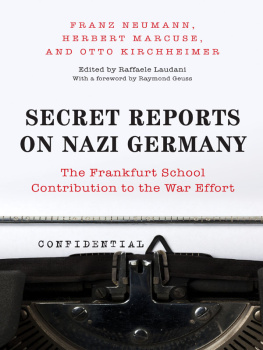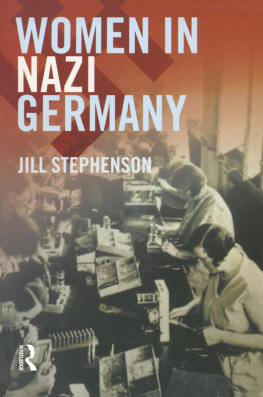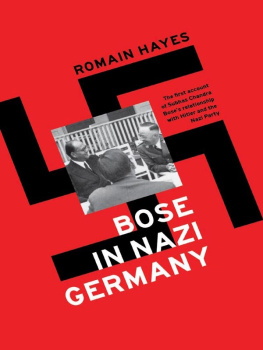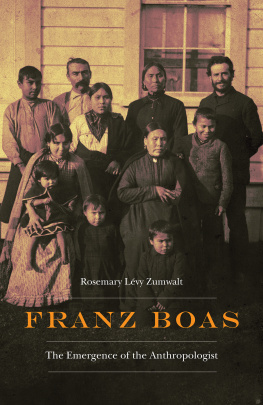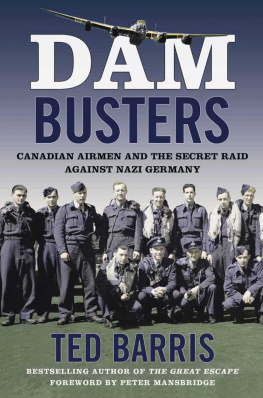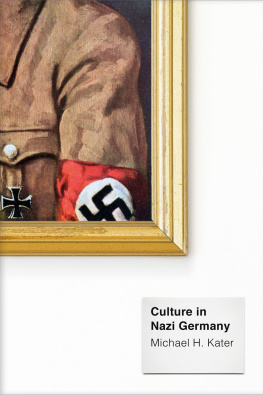Neumann Franz - Secret Reports on Nazi Germany
Here you can read online Neumann Franz - Secret Reports on Nazi Germany full text of the book (entire story) in english for free. Download pdf and epub, get meaning, cover and reviews about this ebook. year: 2013, publisher: Princeton University Press, genre: Politics. Description of the work, (preface) as well as reviews are available. Best literature library LitArk.com created for fans of good reading and offers a wide selection of genres:
Romance novel
Science fiction
Adventure
Detective
Science
History
Home and family
Prose
Art
Politics
Computer
Non-fiction
Religion
Business
Children
Humor
Choose a favorite category and find really read worthwhile books. Enjoy immersion in the world of imagination, feel the emotions of the characters or learn something new for yourself, make an fascinating discovery.
- Book:Secret Reports on Nazi Germany
- Author:
- Publisher:Princeton University Press
- Genre:
- Year:2013
- Rating:5 / 5
- Favourites:Add to favourites
- Your mark:
- 100
- 1
- 2
- 3
- 4
- 5
Secret Reports on Nazi Germany: summary, description and annotation
We offer to read an annotation, description, summary or preface (depends on what the author of the book "Secret Reports on Nazi Germany" wrote himself). If you haven't found the necessary information about the book — write in the comments, we will try to find it.
Secret Reports on Nazi Germany — read online for free the complete book (whole text) full work
Below is the text of the book, divided by pages. System saving the place of the last page read, allows you to conveniently read the book "Secret Reports on Nazi Germany" online for free, without having to search again every time where you left off. Put a bookmark, and you can go to the page where you finished reading at any time.
Font size:
Interval:
Bookmark:

SECRET REPORTS
ON NAZI GERMANY
SECRET REPORTS
ON NAZI GERMANY
The Frankfurt School
Contribution to the War Effort
FRANZ NEUMANN
HERBERT MARCUSE
OTTO KIRCHHEIMER
Edited by Raffaele Laudani
With a foreword by Raymond Geuss
PRINCETON UNIVERSITY PRESS
PRINCETON AND OXFORD
Copyright 2013 by Raffaele Laudani
Requests for permission to reproduce material from this work should be
sent to Permissions, Princeton University Press
Published by Princeton University Press, 41 William Street,
Princeton, New Jersey 08540
In the United Kingdom: Princeton University Press, 6 Oxford Street,
Woodstock, Oxfordshire OX20 1TW
press.princeton.edu
All Rights Reserved
Library of Congress Cataloging-in-Publication Data
Neumann, Franz, 19041974.
Secret reports on Nazi Germany : the Frankfurt School contribution to the
war effort / Franz Neumann, Herbert Marcuse, Otto Kirchheimer ; edited
by Raffaele Laudani ; with a foreword by Raymond Geuss.
p. cm.
Includes bibliographical references and index.
ISBN 978-0-691-13413-0 (hbk.)
1. GermanyPolitics and government19331945. 2. GermanyPolitics and government19451990. 3. GermanySocial conditions19331945. 4. Frankfurt school of sociologyInfluence. 5. Reconstruction (19391951)Germany. 6. World War, 19391945Economic aspectsGermany. 7. World War, 19391945Economic aspectsGermany. 8. World War, 19391945Germany. I. Marcuse, Herbert, 18981979. II. Kirchheimer, Otto. III. Laudani, Raffaele. IV. United States. Office of Strategic Services. Research and Analysis Branch. Central European Section. V. Title. DD253.N425 2013
940.53'43dc23 2013003225
British Library Cataloging-in-Publication Data is available
This book is published with the support of the Department of History,
Anthropology, and Geography at the University of Bologna
This book has been composed in Baskerville 10 Pro
Printed on acid-free paper.
Printed in the United States of America
1 3 5 7 9 10 8 6 4 2
FOREWORD
When Hitler declared war on the United States in the third year of what has come to be called World War II, the US government decided that it needed to have general policies that would be informed by a genuine understanding of who and what its enemy was, what it was trying to do, what strengths and weaknesses it had, and how far it had succeeded in molding Germany, and indeed Continental Europe as a whole, in its preferred image. The conduct of the war required, it was assumed, sober assessment of the real situation and careful thought about the possible long-term outcomes of different policy decisions. In addition, the war needed to be fought with an eye to how it could potentially come, or be brought, to an end; how the process of reconstruction might be managed; and what form a reconstructed Europe might take. To help in formulating such a policy, the US government created a special division, the Research and Analysis Branch (R&A), within its intelligence agency, the Office of Strategic Services (OSS). This research and analysis group tried to recruit as many first-rate minds with wide and appropriate experience as possible, doing so without any special concern for the particular political commitments, national origin, or ideological orthodoxy of those recruited. In the end the analyses this group presented seem to have had some effect on actual policy, although not as much as most of the members of the group would have wished. Many older forms of liberalism had indeed emphasized the inherent value of tolerance and the connection between toleration of intellectual deviancy and success in the pursuit of genuine understanding of the world, but with the onset of the Cold War in the late 1940s, even paying lip service to these ideas came to be thought an expensive luxury that could no longer be afforded. The Research and Analysis Branch was closed in 1949.
In the Anglo-American world of the early twenty-first century, we have become accustomed to a politics of myopic intellectual conformism; of lazy indifference to, and incuriosity about, other people and societies except as potential objects of exploitation or manipulation; of massive governmental deceit; of policy-making by knee-jerk reaction; and of sound bite and television spot as the basic units of political discourse. That in the historical period after George W. Bush and Tony Blair, the above account of the operations in the 1940s of the Research and Analysis Branch of the OSS sounds like the description of an implausible utopia, a never-never land too good to be true, is an indication of how far we have moved on since that time and how much lower expectations about the competence, honesty, and public-spiritedness of governmental agencies have become.
The texts in this volume were written for the R&A division of the OSS between 1943 and 1949. The three main authors, Otto Kirchheimer, Herbert Marcuse, and Franz Neumann, were leftist German-Jewish migrs who were as united in their concerted attempts to understand National Socialism as clearly and fully as possible as they were in their abhorrence of it. All three rejected the view that National Socialism was a mere historical accident resulting from a unique conjunction of unrepeatable contingent circumstances, but they also rejected the view that it was the expression of some essential, underlying, and invariant properties of German culture or national character. To hold the latter view, they thought, would merely be to take at face value what National Socialism itself preached. Finally, they did not believe in the thesis of a German Sonderweg, a special and distinctive path to modernity that represented a deviation from the norms set by other Western European societies. So National Socialism, in their view, was also not the next step in a long-term path of aberrant development, the origins of which lay in an inaccessible, although historically specific, past. Churchills interpretation of National Socialism as a new version of Prussian militarism may have been a politically effective rhetorical gesture in the Britain of the 1930s, but it was actually, the authors claim, a complete mistake: Prussia in the 1930s always exhibited a lower level of electoral support for the Nazis than other parts of Germany did, and members of the Prussian military aristocracy were most notable by their almost complete absence from the higher echelons of the National Socialist Party; devoted, dyed-in-the-wool Party members and proper Junkers always confronted one another with at best deep-seated and very well grounded suspicion and more usually with scarcely veiled mutual loathing. The quasi-feudal structures of preWorld War I Prussia were, for National Socialists, precisely part of the inherited historical rubbish they intended to sweep away. Germany was not to be prussianized, but, on the contrary, Prussia, too, was to be gleichgeschaltetandverreichlicht, to lose its individuality and specific character and become just one more interchangeable cog in the national machine. If one is looking for the sources of German political and military aggression in the twentieth century, Marcuse argues in one of the reports (written together with another young German-Jewish migr, Felix Gilbert, who later became a distinguished historian), they are to be found not so much in Prussian militarism as in the policies of the German industrial bourgeoisie (p. 79). Many very active supporters, including some early and highly substantial financial backers, of National Socialism were captains of industry, who were also clever enough to keep themselves in the background and camouflage themselves, never accepting any high political office or becoming prominent members of the Party. Many of the reports draw attention to this underlying cause and to the ultimate responsibility of industrialists and business groups for the catastrophes of the 1930s and early 40s. If the intention, as seems likely, was to prevent subsequent denazification procedures (and war crimes trials) from focusing too exclusively on high-profile members of the Party and the military, while allowing equally, if less directly, responsible businessmen and other economic agents to escape scot free, this attempt was by and large a failure. Similarly, the authors warn that the group solidarity of the legal profession will most likely make highly needed denazification of judges especially difficult, as in fact turned out to be the case.
Next pageFont size:
Interval:
Bookmark:
Similar books «Secret Reports on Nazi Germany»
Look at similar books to Secret Reports on Nazi Germany. We have selected literature similar in name and meaning in the hope of providing readers with more options to find new, interesting, not yet read works.
Discussion, reviews of the book Secret Reports on Nazi Germany and just readers' own opinions. Leave your comments, write what you think about the work, its meaning or the main characters. Specify what exactly you liked and what you didn't like, and why you think so.

